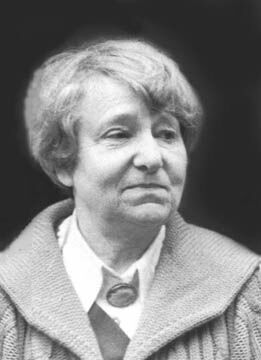Gita Gluskina, the scion of a rabbinical dynasty, was born in the town of Parichi (in present-day Gomel Oblast, Belarus) in 1922. She was the youngest of four daughters. Her father, Menachem-Mendl Gluskin, was a rabbi. Her maternal great-grandfather, Rabbi Yerucham Yehuda Perelman (1835-1896), has become known in Jewish history as "the Gadol of Minsk." In 1924, Menachem-Mendl Gluskin became chief rabbi of Minsk, and he served in this capacity until 1934, when he moved to Leningrad and became chief rabbi of that city. As a child, Gita received a Jewish education and attended a cheder. She spoke very little Russian.
In those years, the children of rabbis (who were deprecatingly referred to as "cultic officials" in Soviet parlance) were barred from attending institutions of higher education. In some cases, they were even unable to complete secondary school. For a time, Gita Gluskina was homeschooled and tutored in Russian.
In 1936, with the adoption of the new Soviet Constitution, the voting restrictions on rabbis' children, and the attendant ban on higher education, were lifted. Menachem Gluskin was already dead by that time. Gita's older sisters enrolled in institutes, while she passed the entrance exams and began to attend a general school, completing it with honors three years later.
In 1940, Gita Gluskina enrolled in the Department of Romance Languages of the Faculty of Philology of Leningrad State University. However, she had to put her studies on hold one year later, because of the outbreak of the Soviet-German War in late June 1941. Gita, who was evacuated along with her sister, found herself in Tatarstan. For two years, she taught geography and physics in the Tatar village of Alexandrovka. In 1943, Gita and her sister Sonya volunteered for frontline duty. Sonya Gluskina was sent to serve on an anti-air armored train, whereas Gita was assigned to a communications battalion. She went on to serve in the communications troops until the end of the war.
After being discharged in 1945, Gita returned to Leningrad and resumed her interrupted studies at the university.
Upon learning that a Department of Assyriology and Hebrew had just opened at the university, Gluskina asked to be transferred there. For the next four years, she diligently studied in that department, under the tutelage of Prof. Isaac Vinnikov. Both her graduate thesis and her subsequent dissertation were dedicated to the works of the medieval Jewish poet Yehuda Alharizi (1170-1235).
Gita graduated from the university in 1949, and stayed on as a teacher at her department. At the height of the campaign against the "rootless cosmopolitans", all the academic staff of the Hebrew Department was subjected to repression. Some were sacked; others were arrested, and the department itself was liquidated. At this time, Gita was summoned to the Leningrad office of the Ministry of State Security, where she was asked to serve as a consultant to the censor who perlustrated Yiddish letters. She managed to wriggle out of this unpleasant task by pointing out that Yiddish was a Germanic, rather than a Semitic, language, and thus it fell outside her area of competence.
Being unable to work in her profession, Gita enrolled in the Faculty of Physics and Mathematics of the Pedagogical Institute. While studying there, she taught mathematics at a school for working youth.
After Joseph Stalin's death in 1953, the regime softened somewhat. Two years later, in 1955, the Department of Semitology was reestablished under the auspices of the Department of Arabic Philology of the Oriental Institute. The teachers who had been sacked, including Gita Gluskina, were able to resume teaching there. For several years, Gita taught Hebrew and medieval Jewish poetry.
In 1960, Gluskina spoke at the International Orientalist Congress in Moscow. In 1968, she defended a candidate's thesis on the unpublished manuscripts of the poet Yehuda Alharizi.
In the 1960s, with the help of the classical scholar Solomon Lurie, Gita Gluskina was able to lay her hands on the microfilms of a medieval manuscript written in Biblical Hebrew. The manuscript was held at the British Museum Library, and the Soviet authorities would not permit her to travel there and peruse it directly. Instead, she had to make do with the microfilms, which were printed on sixty-six sheets of photocopying paper. Gita went on to spend nearly twenty years deciphering this text. In 1983, the Nauka publishing house in Moscow finally published the philosophical-mathematical treatise Meyyasher Aqob ("The Straightener of the Crooked") by Alfonso of Valladolid, the fruit of Gluskina's many years of labor.
In 1990, Gita Gluskina immigrated to Israel, where she continued to work as a translator and participate in conferences on Judaic studies.
Gita Gluskina died in Israel in 2014.







